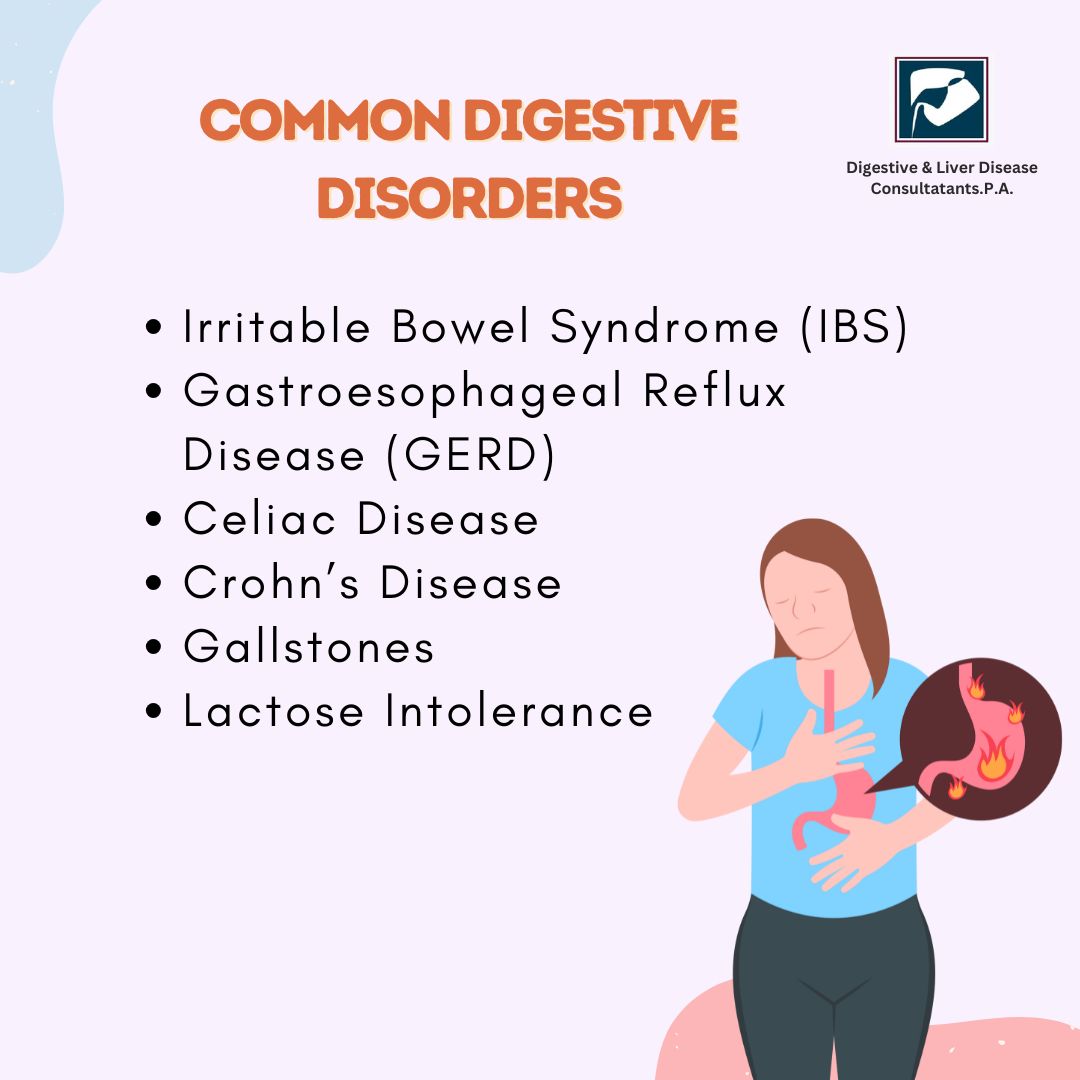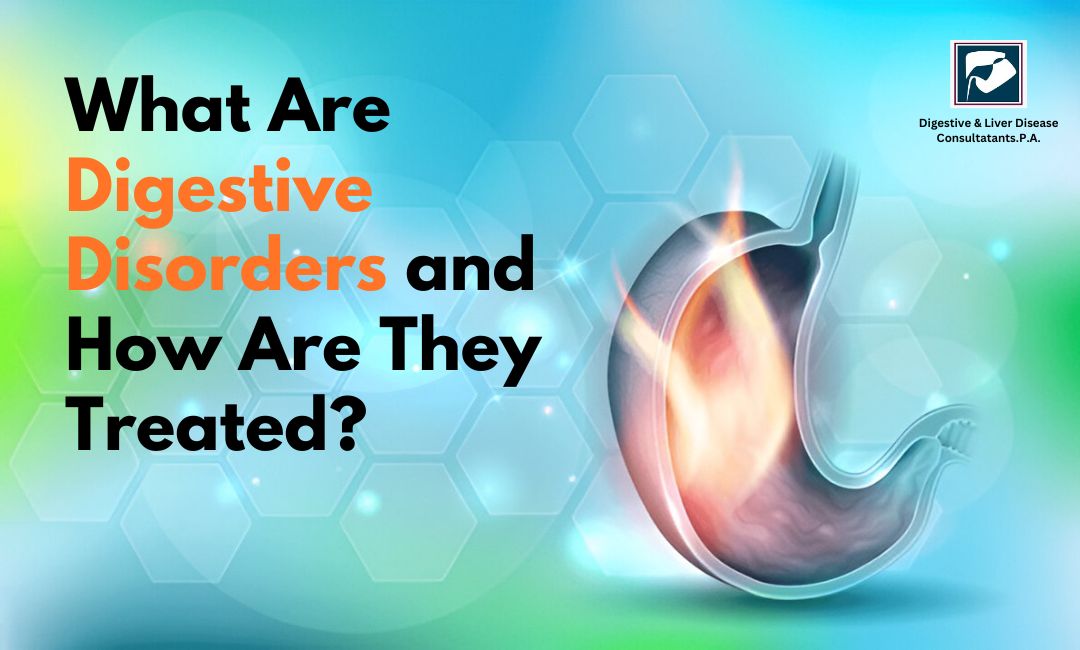Your digestive system plays a vital role in breaking down food, absorbing nutrients, and removing waste from your body. However, when something goes wrong, it can lead to digestive disorders that affect your daily life. From minor discomforts like bloating to serious conditions like Crohn’s disease, digestive disorders can impact your overall health if left untreated.
At Digestive & Liver Disease Consultants, P.A., we specialize in diagnosing and treating a wide range of digestive conditions, helping patients regain their health and well-being. In this blog, we’ll explore common digestive disorders, their causes, symptoms, and available treatments.
Understanding Digestive Disorders
Digestive disorders refer to a group of conditions that affect the gastrointestinal (GI) tract, including the stomach, intestines, liver, pancreas, and gallbladder. These disorders can be temporary or chronic, and they often lead to symptoms like abdominal pain, bloating, nausea, constipation, or diarrhea.

Common Digestive Disorders
Here are some of the most common digestive disorders and how they affect the body:
1. Gastroesophageal Reflux Disease (GERD)
GERD occurs when stomach acid frequently flows back into the esophagus, causing irritation. Symptoms include heartburn, chest pain, and difficulty swallowing.
Treatment: Lifestyle changes (avoiding trigger foods, eating smaller meals), medications (antacids, proton pump inhibitors), and in severe cases, surgery.
2. Irritable Bowel Syndrome (IBS)
IBS is a common condition that affects the large intestine, leading to symptoms like cramping, bloating, diarrhea, or constipation. The exact cause is unknown, but stress and diet can trigger symptoms.
Treatment: Dietary changes, stress management, probiotics, and medications to manage symptoms.
3. Inflammatory Bowel Disease (IBD)
IBD includes Crohn’s disease and ulcerative colitis, both of which cause inflammation in the digestive tract. These conditions can lead to severe pain, weight loss, and fatigue.
Treatment: Anti-inflammatory medications, immune system suppressors, dietary changes, and in some cases, surgery.
4. Celiac Disease
Celiac disease is an autoimmune disorder in which the immune system reacts negatively to gluten, damaging the small intestine. Symptoms include diarrhea, weight loss, and nutritional deficiencies.
Treatment: A strict gluten-free diet is the only effective treatment.
5. Gallstones
Gallstones are hardened deposits in the gallbladder that can cause pain, nausea, and digestive issues. They may form due to excess cholesterol or bile imbalances.
Treatment: Medications, dietary adjustments, or gallbladder removal surgery.
6. Peptic Ulcers
Peptic ulcers are open sores in the lining of the stomach or small intestine, often caused by H. pylori bacteria or excessive use of NSAIDs. Symptoms include stomach pain, nausea, and bloating.
Treatment: Antibiotics (for H. pylori), acid-reducing medications, and lifestyle changes.
7. Constipation and Diarrhea
Both conditions affect bowel movements and can result from poor diet, stress, infections, or underlying health issues.
Treatment: Fiber-rich diet, hydration, probiotics, and medications if necessary.
How Are Digestive Disorders Diagnosed?
At Digestive & Liver Disease Consultants, P.A., our experienced gastroenterologists use advanced diagnostic tools to accurately identify digestive disorders. Some common tests include:
Endoscopy – A small camera is inserted into the digestive tract to examine abnormalities.
Colonoscopy – Used to detect polyps, inflammation, or cancer in the colon.
Blood Tests – Identify infections, inflammation, or nutritional deficiencies.
Imaging Tests (CT Scans, MRI, Ultrasound) – Provide a clear view of the digestive organs.
Treatment Options for Digestive Disorders
The right treatment depends on the specific digestive condition and its severity. Here are some common treatment approaches:
1. Lifestyle Changes
Simple changes can help manage digestive symptoms effectively:
- Eating a balanced diet rich in fiber, lean proteins, and healthy fats.
- Staying hydrated and drinking plenty of water.
- Exercising regularly to promote digestion.
- Managing stress through relaxation techniques like yoga or meditation.
2. Medications
Depending on the condition, medications may be prescribed, including:
- Acid reducers for GERD and ulcers.
- Antibiotics for bacterial infections.
- Anti-inflammatory drugs for IBD.
- Probiotics for gut health.
3. Minimally Invasive Procedures
Some digestive disorders may require medical procedures, such as:
- Endoscopic therapy for bleeding ulcers or polyp removal.
- Balloon dilation for narrowing of the esophagus or intestines.
4. Surgery
In severe cases, surgery may be needed to remove damaged tissue, repair the digestive tract, or remove the gallbladder.
Why Choose Digestive & Liver Disease Consultants, P.A.?
At Digestive & Liver Disease Consultants, P.A., we are committed to providing expert, compassionate care for patients suffering from digestive disorders. Our team of board-certified gastroenterologists offers state-of-the-art diagnostic testing, personalized treatment plans, and ongoing support to help you achieve better digestive health.
Whether you’re experiencing mild discomfort or dealing with a chronic condition, we are here to help you find relief and improve your quality of life.
Conclusion
Digestive disorders can significantly impact your well-being, but with the right diagnosis and treatment, they can be managed effectively. If you are experiencing persistent digestive symptoms, don’t wait to seek help.
If you’re struggling with a digestive disorder, schedule an appointment with Digestive & Liver Disease Consultants, P.A. today. Let our expert team help you get back to feeling your best.






